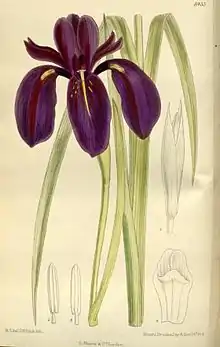Iris chrysographes
Iris chrysographes, the black iris, is a plant species that belongs to the genus Iris. It is native to Southern China and Myanmar (Burma),[2] growing in meadows, streamsides, hillsides and forest margins.[3]
| Iris chrysographes | |
|---|---|
 | |
| Scientific classification | |
| Kingdom: | Plantae |
| Clade: | Tracheophytes |
| Clade: | Angiosperms |
| Clade: | Monocots |
| Order: | Asparagales |
| Family: | Iridaceae |
| Genus: | Iris |
| Subgenus: | Iris subg. Limniris |
| Section: | Iris sect. Limniris |
| Series: | Iris ser. Sibiricae |
| Species: | I. chrysographes |
| Binomial name | |
| Iris chrysographes | |
| Synonyms[1] | |
| |
Other irises with black flowers include Iris nigricans (the national flower of Jordan), Iris petrana, Iris atrofusca, Iris atropurpurea, Iris susiana, and some varieties of Iris germanica.
Classification
Horticultural classification: Sino-Siberian Iris, Beardless Iris.
Description
Iris chrysographes is a clump-forming herbaceous perennial with creeping rhizomes. The leaves are linear and greyish green, and up to 70 cm (28 in) long. The hollow flowering stems, 25–30 cm (9.8–11.8 in) long, bear slightly scented flowers in early summer. These are reddish violet to very dark violet, almost velvety black, and 6–9 cm in diameter. The outer tepals, or falls, usually have narrow golden yellow central stripes. After flowering, the leaves die down, leaving the rhizome in the earth for a dormant period until the autumn, when it sprouts into new growth.
Toxicity
All parts of the plant can cause indigestion if consumed.[4]
Cultivation
Iris chrysographes requires a neutral or acid soil, in full sun. It is hardy to USDA zone 4, −20 °C (−4 °F). Propagation is by seeds or division in the spring. Cultivars cannot be reliably grown from seed, and must be divided. For cooler areas plants do best if planted in the spring.
This plant has gained the Royal Horticultural Society's Award of Garden Merit.[4][5]
Cultivars
Some cultivars are grown, mainly "black" flowered clones under names such as 'Black Beauty', 'Black Knight',[6] 'Black' (syn. 'Black Form', an invalid name), 'Ellenbank Nightshade', 'Stjerneskud' and 'Kew Black'. 'Rubella' is purplish violet.
Iris chrysographes has been used in a number of hybrids with other species.
References
- "Iris chrysographes Dykes is an accepted name". theplantlist.org. 23 March 2012. Retrieved 13 December 2014.
- "A Checklist of the Trees, Shrubs, Herbs, and Climbers of Myanmar. Contributions from the United States National Herbarium. Volume 45: 1-590" (PDF). Retrieved 24 July 2015.
- "Iris chrysographes". Flora of China. Retrieved 3 September 2019.
- "RHS Plant Selector - Iris chrysographes". Royal Horticultural Society. Retrieved 19 October 2020.
- "AGM Plants - Ornamental" (PDF). Royal Horticultural Society. July 2017. p. 53. Retrieved 13 March 2018.
- "Iris chrysographes Black Knight". hessenhof.nl. Retrieved 17 July 2015.